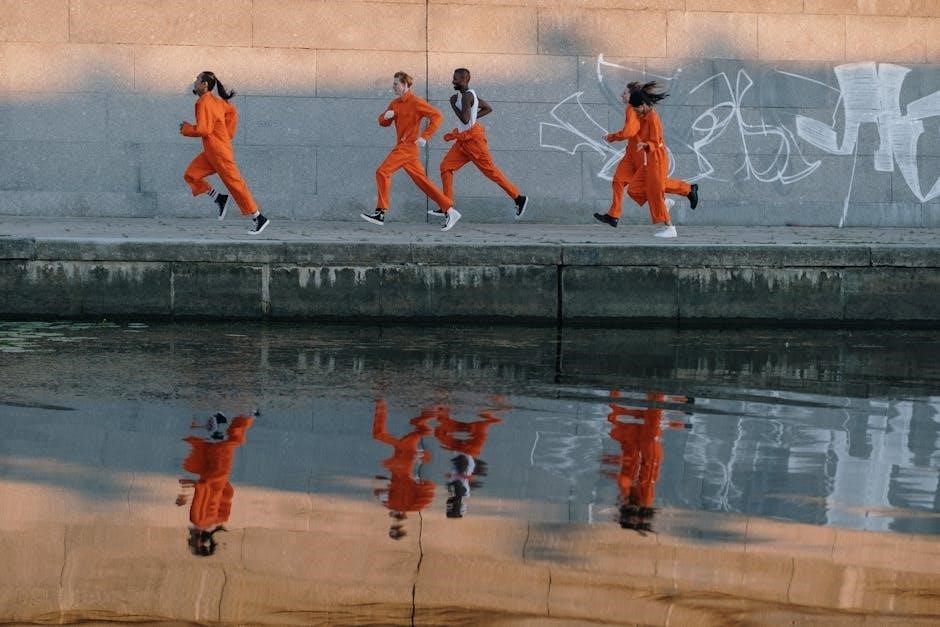The social contract in sport refers to the implicit agreement between athletes, organizations, and society, ensuring fair play and mutual respect, reflecting societal values and ethical standards.
1.1. Definition and Historical Context of the Social Contract
The social contract is an implicit agreement among individuals in a society to cooperate for mutual benefit. Historically, philosophers like Rousseau and Hobbes explored this concept, emphasizing collective governance and moral obligations. In sport, this idea translates to shared expectations of fair play, respect, and adherence to rules. Eassom (2005) highlights how sport reflects societal norms, with the social contract ensuring a balance between competition and ethics. Over time, this concept has evolved, integrating values like inclusivity and equality, shaping sport’s role in fostering social cohesion and moral behavior. Understanding its historical roots is crucial for grasping its contemporary relevance in sport.
1.2. Sport as a Reflection of Societal Values and Norms
Sport serves as a mirror to society, reflecting its values, norms, and cultural dynamics. Eassom (2005) notes that sport is deeply embedded in societal structures, influencing and being influenced by broader social trends. It reinforces norms like teamwork, discipline, and fair play while also addressing issues like inequality and inclusion. Historical events, such as the integration of sports leagues, highlight how sport can drive social change. The social contract in sport ensures that these values are upheld, fostering a sense of community and shared identity. As society evolves, so too does sport, making it a dynamic and powerful reflection of human culture and ethics.

The Evolution of Sport and Society
Sport has evolved alongside societal changes, reflecting shifts in culture, values, and norms. It has transitioned from amateur pursuits to professional industries, shaping and being shaped by society.
2.1. Historical Development of Sport and Its Role in Shaping Society
Sport has historically served as a mirror of societal values, evolving from ancient rituals to modern competitions. Early sports often reflected religious or tribal identities, fostering community cohesion. The ancient Olympics, for instance, symbolized peace and unity among Greek city-states. During the Middle Ages, sports like jousting reinforced feudal hierarchies. The Industrial Revolution brought standardized rules and organized leagues, aligning sport with national identity and social progress. Sport has consistently shaped societal norms, promoting ideals like fair play, teamwork, and perseverance. Its historical development underscores its dual role: reflecting existing social structures while influencing cultural change and fostering collective identity across generations.
2.2. The Impact of Social Movements on Sport
Social movements have profoundly influenced sport, challenging existing norms and fostering inclusivity. The civil rights movement, for example, pushed for racial integration in sports, with figures like Jackie Robinson breaking barriers. Feminist movements advocated for gender equality, leading to increased participation of women in sports. More recently, movements like Black Lives Matter have brought attention to systemic racism within sport, sparking conversations and policy changes. These movements have reshaped sport’s role in society, emphasizing its potential as a platform for social change and equality. Sport has become a powerful tool for addressing broader societal issues, reflecting the evolving values of the communities it serves.

Theoretical Foundations of the Social Contract in Sport
The social contract in sport is rooted in philosophical theories of cooperation and mutual respect, drawing from Hobbes, Locke, and Rousseau, emphasizing collective norms and ethical behavior.
3.1. Philosophical Underpinnings of the Social Contract
The social contract in sport is deeply rooted in philosophical traditions, drawing from thinkers like Hobbes, Locke, and Rousseau. These philosophers emphasized the idea of mutual agreement and cooperation to maintain order and harmony in society. In the context of sport, this translates to unwritten rules and shared expectations that govern behavior among athletes, officials, and fans. The concept of fair play, for instance, reflects Locke’s notion of mutual respect and reciprocity. Similarly, Rousseau’s idea of a collective will aligns with the collaborative spirit of team sports. These philosophical underpinnings ensure that sport operates as a microcosm of societal values, fostering trust and cooperation. By adhering to these principles, sport upholds its role as a unifying force in society.
3.2. Application of Social Contract Theory to Sport
The application of social contract theory to sport involves understanding the implicit agreements that govern behaviors and expectations within athletic communities. Athletes, coaches, and officials collectively adhere to rules and norms, ensuring fair competition and respect for others. This mutual understanding fosters a sense of unity and shared purpose, mirroring societal contracts. In sport, the social contract is evident in practices like handshake lines after games and the adherence to unwritten codes of sportsmanship. These norms are essential for maintaining the integrity and appeal of sports, reinforcing trust and cooperation among participants. By upholding these unwritten agreements, sport serves as a powerful example of how social contracts can promote harmony and collective success in various aspects of life.
The Role of Sport in Civic Engagement and Social Cohesion
Sport fosters civic engagement by uniting diverse communities and promoting social cohesion through shared experiences and collective goals, enhancing societal bonds and mutual understanding.
4.1. Sport as a Tool for Promoting Social Unity
Sport serves as a powerful tool for fostering social unity by transcending cultural, racial, and socioeconomic divides. Through shared participation and collective goals, it creates a sense of belonging. The social contract in sport emphasizes mutual respect and fair play, which are essential for building harmony among diverse groups. Sporting events often act as platforms where individuals from different backgrounds come together, reinforcing societal cohesion. This unity is further strengthened by the promotion of ethical behavior and teamwork, which are fundamental to maintaining the social contract. As a result, sport plays a vital role in bridging gaps and fostering a unified community.
4.2. The Influence of Sport on Civic Identity and Participation
Sport significantly shapes civic identity by fostering a sense of shared purpose and belonging among individuals. It encourages active participation in societal activities, promoting engagement in public life. The social contract in sport underscores the importance of fair play and respect, which mirror civic values. Sporting events and teams often become symbols of local and national pride, strengthening community bonds. This shared identity motivates individuals to contribute to societal well-being, reinforcing the social contract. Sport’s ability to unite people across diverse backgrounds highlights its role in promoting civic engagement and fostering a collective sense of responsibility, essential for maintaining social cohesion and active citizenship.
The Intersection of Sport and Ethics
Sport and ethics intertwine through principles like fair play and sportsmanship, ensuring respect and integrity in competition, reflecting societal moral standards and values.
5.1; Ethical Issues in Sport and Their Social Implications
Ethical issues in sport, such as doping, match-fixing, and discrimination, undermine fair play and societal trust. These violations reflect broader social challenges, like inequality and corruption, shaping public perception and moral standards. The social contract in sport is tested when ethical breaches occur, as they erode the mutual respect and integrity expected by athletes and fans. Addressing these issues requires a collective effort to uphold ethical norms, ensuring sport remains a positive force in society. The implications extend beyond the playing field, influencing societal values and the role of sport as a moral guide. Ethical accountability is essential to maintaining the social contract and fostering a just sporting culture.
5.2. The Role of Fair Play and Sportsmanship in Maintaining the Social Contract
Fair play and sportsmanship are cornerstone values in sport, essential for upholding the social contract. They ensure respect, equality, and integrity among participants, fostering a positive sporting environment. Fair play promotes ethical behavior, discouraging cheating and unsportsmanlike conduct, which can damage trust and societal expectations. Sportsmanship extends beyond victory, emphasizing grace in both success and defeat. These principles strengthen social bonds, reinforcing the collective agreement that sport should be a platform for mutual respect and camaraderie. By adhering to fair play and sportsmanship, athletes and organizations maintain the social contract, ensuring sport remains a unifying and ethical force in society. Their practice is vital for sustaining public faith and the moral fabric of sport.

The Impact of Mass Media on Sport and Society
Mass media shapes public perception of sport, influencing societal values and norms, while broadcasting events amplify their cultural and social significance globally.
6.1. The Role of Media in Shaping Public Perception of Sport
Media plays a pivotal role in shaping public perception of sport by broadcasting events, sharing athlete stories, and influencing societal values. Through live coverage and highlights, media creates shared experiences, fostering emotional connections and shaping cultural narratives. The way media frames victories, defeats, and controversies significantly impacts how the public views athletes and teams. Moreover, media narratives often emphasize ethical dilemmas, such as fair play and sportsmanship, which align with the social contract in sport. However, sensationalism can sometimes distort realities, amplifying conflicts and scandals. This duality highlights the power of media in both reflecting and constructing societal perceptions, making it a key influencer of sport’s role in society.
6.2. Media Representation and the Social Contract in Sport
Media representation significantly influences the social contract in sport by shaping perceptions of fairness, equality, and inclusion. Balanced coverage ensures diverse voices are heard, fostering a sense of unity and shared values. However, biased or limited representation can marginalize certain groups, undermining the social contract. Media’s portrayal of ethical issues, such as doping or discrimination, highlights the importance of accountability and fair play. By promoting positive narratives, media can strengthen the social contract, ensuring sport remains a reflection of societal ideals and a tool for social cohesion. Ethical reporting thus becomes crucial in maintaining trust and upholding the principles that bind sport and society together.

The Economic Dimensions of Sport and the Social Contract
The economic dimensions of sport influence the social contract through job creation, revenue generation, and sponsorship, yet financial disparities can lead to inequality and social division.
7.1. The Economic Impact of Sport on Society
Sport significantly contributes to the economy through job creation, infrastructure development, and tourism. Major events like the Olympics or FIFA World Cup boost local economies, generating substantial revenue. However, economic disparities arise when resources are unevenly distributed, often favoring elite leagues over grassroots programs. This imbalance can strain the social contract, as communities may feel excluded from the benefits. Additionally, commercialization of sport raises ethical concerns, such as exploiting athletes for profit, which can undermine societal trust. Despite these challenges, sport remains a powerful tool for economic growth and social development when managed equitably.
7.2. Financial Inequalities and Their Effect on the Social Contract in Sport
Financial inequalities in sport undermine the social contract by creating disparities in access, resources, and opportunities. Wealthier teams and leagues often dominate, while grassroots programs struggle due to limited funding. This imbalance can lead to a sense of exclusion among underprivileged groups, eroding trust in the system. Commercialization exacerbates these issues, as profit often takes precedence over fairness and inclusivity. The social contract in sport is further strained when financial gains are prioritized over ethical considerations, such as fair compensation for athletes. Addressing these inequalities requires equitable resource distribution, transparency, and a commitment to fostering inclusivity to uphold the shared values of sport and society.

Globalization and Its Effects on Sport and Society
Globalization has transformed sport into a global phenomenon, fostering cultural exchange and economic opportunities. However, it also introduces challenges, such as cultural homogenization and economic disparities, impacting societal norms and the social contract in sport.
8.1. The Globalization of Sport and Its Implications for the Social Contract
Globalization has significantly influenced sport by creating a worldwide market for athletes and events. This interconnectedness brings diverse cultures together, fostering unity. However, it also raises ethical concerns such as economic disparities and exploitation. The social contract in sport is challenged as local traditions and amateur ideals are overshadowed by commercialization. Ensuring fair play and equitable opportunities becomes crucial to maintaining the integrity of the social contract. Global events like the FIFA World Cup highlight both the unifying potential and the ethical dilemmas of globalized sport, emphasizing the need for a balanced approach to uphold societal values and norms in this evolving landscape.
8.2. The Role of International Sporting Events in Shaping Global Societal Norms
International sporting events, such as the Olympics and the FIFA World Cup, serve as powerful platforms for shaping global societal norms. They promote unity and cultural exchange while addressing social issues like equality and human rights. These events often highlight ethical dilemmas, such as discrimination and corruption, sparking global conversations. By showcasing diverse athletes and their stories, they inspire change and challenge stereotypes. The social contract in sport is reinforced as these events emphasize fair play, inclusivity, and mutual respect. Ultimately, international sporting events act as catalysts for societal progress, reflecting and influencing the values of a global community striving for unity and justice.

The Future of Sport and the Social Contract
The future of sport and the social contract lies in addressing ethical concerns, embracing technology, and fostering global unity, ensuring fair play and societal trust endure.
9.1. Emerging Trends in Sport and Their Impact on Society
Emerging trends in sport, such as the integration of technology, globalization, and shifting societal values, are reshaping the social contract. The rise of digital platforms and media influence has amplified sport’s role in reflecting and shaping public discourse. Issues like diversity, inclusion, and ethical governance are gaining prominence, as society demands greater accountability from athletes and organizations. The commercialization of sport also raises questions about equity and access, particularly in light of financial inequalities. These trends underscore the dynamic nature of the social contract, requiring sport to adapt to evolving societal expectations while maintaining its core values of fair play and unity; The future of sport hinges on its ability to balance tradition with innovation, ensuring it remains a unifying force in an increasingly complex world.
9.2. The Need for Adaptation in the Social Contract of Sport
The social contract in sport must evolve to address contemporary challenges and societal changes. As sport becomes more globalized and commercialized, ethical dilemmas and inequalities arise, requiring new frameworks for fairness and inclusion. Technological advancements, such as AI and digital platforms, are reshaping how sport is consumed and governed, demanding updated norms. Additionally, shifting societal values around diversity, equity, and sustainability necessitate a reevaluation of sport’s role in fostering social cohesion. Adaptation ensures that sport remains a reflection of societal progress, balancing tradition with innovation to maintain its unifying power. Failure to adapt risks eroding trust and relevance, underscoring the urgency for proactive change in the social contract;
The social contract in sport remains vital, evolving to meet societal changes and ethical challenges, ensuring trust, fairness, and shared values between athletes, organizations, and society.
10.1. Summary of Key Points
The social contract in sport is rooted in societal values, ethics, and mutual respect. It reflects the dynamic relationship between athletes, organizations, and society, ensuring trust and accountability. Sport serves as a mirror of societal norms, influencing civic identity and fostering social cohesion. Ethical issues, such as fair play and sportsmanship, are critical to maintaining this contract. The evolution of sport, shaped by historical developments and social movements, highlights its role in reflecting and shaping societal change. Globalization and media influence further complicate the contract, emphasizing the need for adaptation. Ultimately, the social contract in sport requires ongoing dialogue and ethical frameworks to remain relevant and effective in a changing world.
10.2. Final Thoughts on the Significance of the Social Contract in Sport
The social contract in sport is a foundational framework that ensures trust, accountability, and ethical behavior among athletes, organizations, and society. It reflects the shared values and expectations that govern sport’s role in fostering social unity and civic engagement. By upholding principles of fair play and respect, the social contract maintains the integrity of sport as a reflection of societal norms. As sport evolves, adapting to global challenges and ethical dilemmas becomes crucial; The social contract serves as a guiding force, ensuring sport remains a positive influence on society. Its significance lies in its ability to balance tradition with innovation, fostering a sense of community and shared purpose.